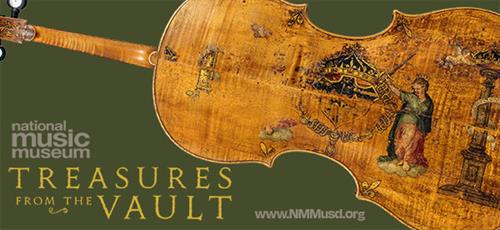Date and Time
Saturday Dec 7, 2024
10:00 AM - 4:00 PM CST
Saturday, December 7
10am - 4pm
Location
National Music Museum
Vermillion, SD
Fees/Admission
Included with Museum Admission
Website
Contact Information
605-658-3450
Send Email

Description
New National Music Museum Exhibit Featuring Rare Stringed Instruments Set to Open in December
The National Music Museum (NMM) invites visitors to view some of the most significant and beautifully crafted stringed instruments in the world with the opening of its newest exhibit, “Treasures from the Vault.” Opening on Saturday, December 7, as part of the NMM's Discovery Saturday festivities, this special exhibit will showcase the exquisite craftsmanship of master luthiers like Andrea Amati, Antonio Stradivari, and Jacob Stainer.
The day will begin with a gallery talk hosted by Arian Sheets, NMM Curator of Stringed Instruments, at 1:00 p.m. Visitors will learn about the history, artistry, and significance of these exceptional instruments. Following the gallery talk, a general museum tour will be offered at 2:30 p.m. to explore the NMM’s vast collection of musical treasures. All activities, including the gallery talk and tours, are included with regular museum admission.
After its opening in December, “Treasures from the Vault” will remain open in the NMM’s Larson Gallery through 2025. Among exhibit highlights are the "King" violoncello by Andrea Amati, dating back to the mid-1500s, and three of the NMM’s Antonio Stradivari masterpieces. Sixteenth and 17th century citterns will also be on exhibit alongside several other notable instruments including a rare Jacob Stainer violin from 1668.
Instruments featured in the exhibit include:
· Violoncello, The ‘King’
Andrea Amati, Cremona, Italy, ca. 1536-1560
The “crown” jewel of the Witten-Rawlins Collection, this exquisite cello was crafted by Andrea Amati, the founder of the Cremonese violin-making tradition, and bears painting from the reign of King Charles IX of France, dating to the 1560s. Witten-Rawlins Collection, 1984. NMM 03351.
· Cittern
Rafaello a Urbino, Urbino, Italy, ca. 1538
This rare Renaissance cittern, carved from a single piece of wood and adorned with grotesque figures and an armorial highlights the intricacies of 16th-century Italian craftsmanship. Witten-Rawlins Collection, 1984. NMM 03386.
· Violin, The ‘Harrison’
Antonio Stradivari, Cremona, Italy, 1693
Exceptionally well-preserved, this Stradivari violin is notable for its original neck and slightly elongated body. It represents a key period in Stradivari’s experimentation with the violin form. Rawlins Fund, 1985. NMM 03598.
· Guitar The ‘Rawlins’
Antonio Stradivari, Cremona, Italy, 1700
One of only five surviving Stradivari guitars, this instrument reflects the Stradivari’s interpretation of the Spanish guitar tradition with a unique longer string length and violin-like varnish. Rawlins Fund, 1985. NMM 03976.
· Violin
Jacob Stainer, Absam, Austria, 1668
This masterwork by Jacob Stainer, known for its originality and the use of very old wood, has growth patterns that date back to the 15th century. Board of Trustees, 1989. NMM 04548.
· Choral Mandolin, The ‘Cutler-Challen’
Antonio Stradivari, Cremona, Italy, 1680
A rare and lightweight mandolin crafted by Stradivari, is one of two surviving examples from his workshop, and showcases a unique shape and construction. Purchase funds gift of Mr. and Mrs. Richard A. Cutler, 1997. NMM 06045.
· Cittern
Labeled Petrus Rautta, England, ca. 1620
This unique English cittern with a humorous "howling dog" head design, it is the only surviving example of this instrument and shows extensive wear from use. Arne B. and Jeanne F. Larson Fund, 2007. NMM 13500.
· Treble Viola Da Gamba
John Hoskin, England, 1609
This beautifully crafted treble viol, notable for its distinctive knot-pattern inlay, is only surviving example of John Hoskin’s work. Rawlins Fund, 1986. NMM 03986.
The National Music Museum is internationally known for its exceptional collection of stringed instruments, making it a travel destination for music lovers, scholars, and collectors alike. Highlights of the collection include five instruments made by Andrea Amati, recognized as the first maker of violins as we know them today; five instruments by Antonio Stradivari; two unaltered instruments made by Jacob Stainer in the mid-1600s; and notable instruments from other esteemed makers such as Andrea Guarneri, Ferdinand Gagliano, Lorenzo Storioni, Giovanni Grancino, G.B. Ceruti, Giovanni Maggini, Nicola Bergonzi, Gaspar da Salo, along with numerous other European stringed instruments from 1600 to 1800, in nearly unaltered condition.
Located on the campus of the University of South Dakota in Vermillion, SD, the permanent exhibits at the NMM are open to the public Tuesdays-Saturdays from 10:00-4:00. Discovery Saturdays at the NMM take place on the first Saturday of each month. On these special days, visitors can enjoy additional activities and educational tours throughout the Museum. More information on “Treasures from the Vault” and Discovery Saturdays can be found online at www.NMMusd.org.
